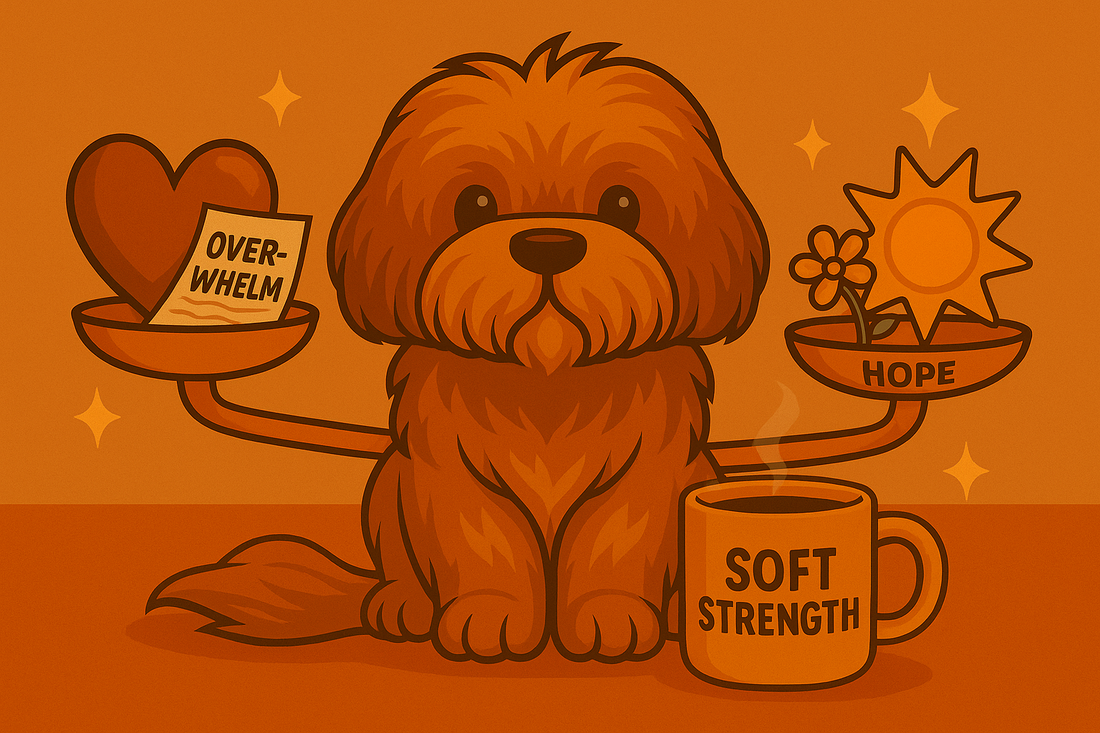
Holding Heavy and Light at Once: Gentle Productivity on Hard Days
Share
Why Gentle Productivity Matters
We live in a culture obsessed with output. Checklists, hustle quotes, endless talk about “maximizing potential.” But what happens when your potential feels maxed out just by existing? Gentle productivity is the antidote. It is the practice of acknowledging that some days are not built for efficiency, but they still hold value.
Gentle productivity does not mean doing nothing. It means doing only what your capacity allows. Some days that might be finishing a report. Other days it might be brushing your teeth and texting a friend “still alive.” Both count. Both are valid.
Emotional Duality: You Are Not Just One Thing
One of the hardest truths to accept is that we can hold contradictory feelings at the same time. You can be grateful and exhausted, optimistic and anxious, sad and still laughing at memes. That duality does not make you inconsistent. It makes you human.
Gentle productivity works because it honors both sides. It leaves room for the heavy and the light. You are allowed to rest and still count the day as meaningful. You are allowed to set a tiny goal and celebrate it without guilt that it was not bigger.
Practical Steps for Capacity-Based Planning
When your brain feels tender, planning your day should not look like a military operation. Try these softer methods instead:
1. Pick One Anchor Task
Instead of writing a list of ten things, choose one anchor. It might be sending a single email, folding laundry, or scheduling a doctor’s appointment. That one task becomes your win, your proof that you showed up in some way.
2. Shrink the Frame
Ask: what can I do in the next 20 minutes, not the next 12 hours? Gentle productivity lives in shorter frames of time. Big blocks of planning are intimidating, but 20 minutes feels manageable.
3. Use Capacity Language
Shift from “I have to do everything” to “I have capacity for this.” It changes the internal narrative from failure to choice.
4. End with Soft Closure
At the end of the day, instead of measuring success by what is unfinished, measure it by what was possible. Sometimes that is three tasks. Sometimes it is one. Both are enough.
The Psychology of Small Wins
Psychologists call it the “progress principle”: we feel more motivated and emotionally balanced when we notice even minor accomplishments. On a hard day, those micro wins are everything.
Sending a text. Washing a cup. Walking around the block. Each small win creates momentum, which in turn builds a fragile sense of hope. You are not stuck, even if movement is slow.
Giving Yourself Permission
Self-compassion is not indulgence. It is survival. Research by Dr. Kristin Neff shows that self-compassion leads to better resilience and lower stress. On hard days, giving yourself permission to step back is not weakness — it is how you protect your mental health long term.
Permission sounds like:
- “I am allowed to move slowly today.”
- “I can show up imperfectly and it still counts.”
- “My value is not tied to my productivity.”
The Weight of Collective Grief
September 11 carries a cultural heaviness. For many, it is a day of remembrance, reflection, or grief that resurfaces year after year. Productivity feels complicated on days like this. The body remembers, even when the mind tries to move on.
Gentle productivity honors that collective memory. It says: you can hold space for grief and still take care of yourself. You can pause to reflect and also water your plants. The heaviness does not cancel out the light; they coexist.
Practices That Blend Heavy and Light
Here are ways to live the duality on hard days:
- Write two lists: one of things you must carry today, and one of things that make you smile. Keep both side by side.
- Pair tasks: load the dishwasher while listening to a funny podcast. The heavy with the light.
- Rest actively: instead of scrolling endlessly, take a nap, doodle, or sit outside. These count as both gentle rest and forward motion.
- Invite softness: play music, light a candle, or drink something warm. Small rituals remind you that not everything has to be hard.
Redefining Productivity
The world tells us productivity is output. But maybe productivity on a hard day is simply presence. Maybe it is showing up in your own life in whatever form you can.
Gentle productivity is not laziness. It is courage. It takes strength to admit that you cannot do everything, and compassion to keep going anyway.
FAQ: Gentle Productivity on Hard Days
Q: How do I know what counts as “enough”?
A: Enough is what you can reasonably do without breaking yourself. If one task drained your energy, that was your capacity. Respect it.
Q: What if other people expect more from me?
A: Other people’s expectations are not your measurement. You are the one living your day. Let their urgency stay with them.
Q: How do I balance grief with responsibilities?
A: You do it by carrying both, not by pretending one does not exist. Pair responsibility with compassion.
Q: Can I plan a day that is both hard and joyful?
A: Absolutely. Write in your anchor task, then write in one joy: a call with a friend, a short walk, your favorite song. That is balance.
Wrap-Up: Holding Both Without Shame
Gentle productivity asks you to believe that you are not less worthy on the days you do less. You are a whole person whether you cross off twenty tasks or one.
On heavy days, do not push yourself into perfection. Instead, let yourself hold both: the grief and the gratitude, the tiredness and the small sparks of joy, the quiet and the motion. Life is never just one thing. Neither are you.
